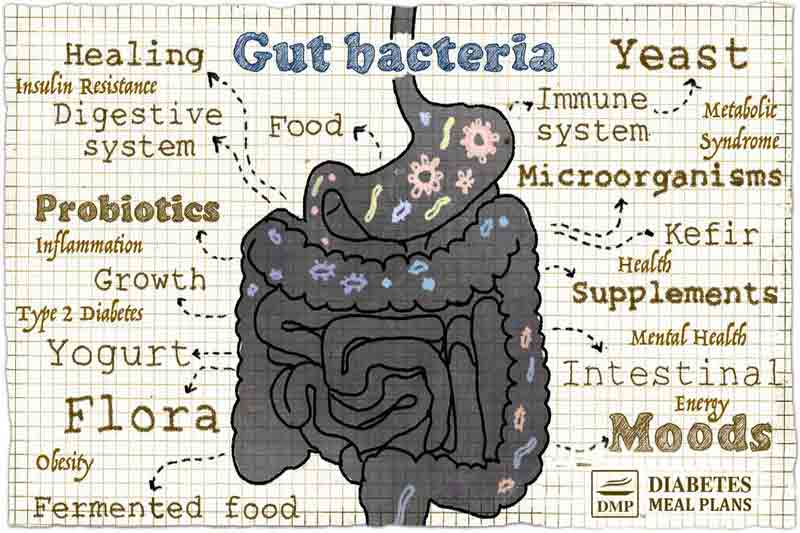Table of Contents[Hide][Show]
The “microbiome” has become a buzzword in recent years when discussing diet, and for good reason. In the past few decades, science has discovered so much about the microbiome and its impact on human health, including for people with type 2 diabetes.

What is the Microbiome?
In simple terms, the microbiome of your gut is just the collection of bacteria, fungi, and other microorganisms that live there.
These organisms help direct many functions in the body like fat and glucose metabolism and other aspects of digestion and energy production.
While the microbiome technically contain many more organisms beyond bacteria, we’ll be using the terms “microbiome” and “gut bacteria” interchangeably.
Just remember that all these microorganisms may be tiny, but their impact on your health can be massive!
Diet and Gut Bacteria
Your diet has a direct influence on your health, especially when we’re discussing type 2 diabetes.
If you eat a doughnut or slurp down a sugary soda then your blood sugar will spike, causing unpleasant effects in the short term and the long term. Poor diet choices may result in higher blood sugar levels and a larger waistline pretty quickly.
But, the relationship between what you eat and how you feel goes even deeper than that. The connection between your diet and the health of your gut bacteria is a little more indirect, but it’s just as important.
Now, a portion of your gut microbiome is genetic and much of it is established in the first few years of life which, of course, you don’t have any major control over. But it doesn’t end there. The microbiome continues to grow and develop during adolescence and even into adulthood, shifting one way or another with every food and beverage you choose to consume.
Let’s talk about that…
The Impact of Proteins, Fats, and Carbohydrates
Here at DMP, we talk a lot about how carbohydrates have the biggest influence on blood sugar levels, and it turns out that they also have a big impact on your gut bacteria.
A 2020 review on diet and metabolism found that simple carbohydrates (like sucrose and fructose) caused rapid deregulation of the microbiome, which can lead to metabolic dysfunction and chronic illness.
The researchers went on to explain that “microbiota accessible carbohydrates,” which are primarily found in dietary fiber, were beneficial to gut bacteria.
Studies in this review found that the regular consumption of soluble fiber (30 g/day) was correlated with increased production of butyrate (an anti-inflammatory substance) due to the flourishing of multiple bacteria.
Basically, eating a variety of high fiber veggies and low carb fruits leads to a more diverse microbiome and better health outcomes!
That covers carbohydrates, but what about other foods?
The same review concluded that the consumption of meat protein positively correlated with microbial diversity as well, so no need to shy away from modest servings of clean meats.
When it comes to fats, both the quality of fats eaten and the quantity have an impact on gut bacteria.
They found that a diet high in monounsaturated fats (like olive oil, nuts, avocados) and polyunsaturated fats (fish oil, flax seed oil, walnuts) contributed to the increase of beneficial bacteria.
These studies highlight the importance of having a well-rounded and diversified diet.
📌 Consume a wide variety of different sources of fats (mostly monounsaturated fats) and proteins but most importantly, eat lots of foods high in dietary fiber – think vegetables, fruits, chia seeds, and nuts.
Microbiome and Chronic Diseases
Obesity is a very common problem today that can be rooted in a disrupted metabolism.
Yes, the foods you choose to eat and the exercise you choose to engage in go a long way towards fighting obesity, but the microbiome also plays a significant role in body fat storage.
The gut microbiome directs nutrient absorption and storage, as well as the metabolism of carbs and lipids, digestion and motility. It also regulates the immune and hormonal systems, which affect fat storage.
These impacts have been demonstrated in animal studies.
One study found that germ-free mice (those engineered to have no gut bacteria) had a 60% increase in body fat and developed insulin resistance just 14 days after being colonized with microbiome samples from conventionally raised mice. Amazingly, the germ-free mice gained weight even though their calorie intake actually decreased after being colonized with bacteria from the other mice.
This really shows the impact that a poor microbiome can have on body weight, even when adjusting for calorie intake.
Moving over into human examples, a Danish study observed that human participants with a lower microbial gene count were more likely to suffer from obesity, insulin resistance, high blood lipids, excess body fat, and worse inflammatory status.
Microbiome dysregulation has also been seen in patients with type 2 diabetes.
European researchers (2013) found that patients with type 2 diabetes, especially those who also struggled with obesity, had a lower abundance of fiber-dependent gut bacteria when compared to healthy participants.
Patients with type 2 diabetes were also found to have fewer beneficial bacteria and more opportunistic pathogens in their gut, resulting in impaired gut integrity (which is a risk factor for insulin resistance).
Dyslipidemia, which is elevated triglycerides or LDL cholesterol, is a key factor in atherosclerosis and cardiovascular disease. Not surprisingly, this condition may also be influenced by the microbiome.
Research has found that reduced microbial diversity is commonly observed in obese patients who also have increased total cholesterol and elevated triglycerides.
Animals studies have observed the anti-obesity and lipid-lowering effects of specific microorganisms when they were given to rats to improve gut health.
📌 There are trillions of gut bacteria in our bodies and they are connected to the state of our health in many ways. Focus on eating a diverse range of fresh whole foods to improve your health and prevent chronic disease.

3 Ways to Improve Your Microbiome
1. Boost your fiber intake through veggies and fruits
As stated earlier, a major way to improve your gut microbiome is to eat more dietary fiber as the beneficial bacteria in your gut rely on this fiber for fuel.
Studies have reported that the microbial fermentation of certain carbohydrates (like fruits, nuts, beans, and vegetables) leads to the formation of short chain fatty acids, which may have benefits against obesity, non-alcoholic fatty liver disease, and diabetes.
So, load up on those high-fiber foods, especially the low carb veggies!
Here are some ideas to get you started:
- Seeds: Chia, flax, pumpkin, and sunflower seeds
- Nuts: almonds, walnuts, cashews, pecans, hazelnuts
- Green veggies like spinach, kale, arugula, Brussels sprouts, fennel, broccoli, cabbage
- Berries: raspberries, blackberries, strawberries
- Other: Beets, eggplant, avocado, artichoke
- Small servings of beans and legumes: about 1/4 cup as these are high in carbs
2. Reduce your consumption of extra sugar, salt, alcohol, and processed foods
It’s not breaking news that a diet high in added sugars, alcoholic drinks, and excess sodium is unhealthy…but now you’ve got one more good reason to avoid highly processed foods.
Research suggests that “there is strong evidence that the Western-style diet causes disorders of the microbiota, intensifies the chronic inflammatory process, and consequently leads to the development of metabolic disorders and cardiovascular diseases.”
Keep things simple and stick to whole, fresh foods rather than pre-packaged, processed foods that your body doesn’t recognize and know how to utilize for energy.
3. Eat a variety of healthy foods
Choose a variety of healthy foods and rotate things in and out of your meal plans regularly in order to get the most benefits.
Both plant and animal-based foods can have different beneficial effects on the microbiome, so eat well-rounded diet that contains different sources of proteins, fats, and healthy carbs.

Ella George
I like the info on micro very good,my BG is at 7 am working on getting it down to 6,thank you so much. Is there a receipe for or substitute for syrup on a waffle, I make my own waffle with almond flour ,
Jedha: Nutritionist (MNutr)
That’s great work Ella – well done! You can find some sugar free syrups like this one. Good for sometimes but not an everyday food.